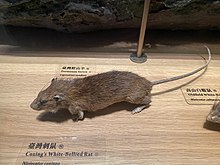Coxing's white-bellied rat: Difference between revisions
Appearance
Content deleted Content added
+Category:Taxa named by Robert Swinhoe; +Category:Rats of Asia using HotCat, IUCN update, names, habitat |
ce to lede. |
||
| (3 intermediate revisions by 3 users not shown) | |||
| Line 1: | Line 1: | ||
{{Short description|Species of rodent}} |
{{Short description|Species of rodent}} |
||
{{Speciesbox |
{{Speciesbox |
||
| image = Niviventer coxingi.jpg |
|||
| name = Coxing's white-bellied rat |
|||
| status = LC |
| status = LC |
||
| status_system = IUCN3.1 |
| status_system = IUCN3.1 |
||
| status_ref = <ref name= |
| status_ref = <ref name="iucn status 17 November 2021">{{cite iucn |author=Johnston, C. |author2=Smith, A.T. |date=2016 |title=''Niviventer coninga'' |volume=2016 |page=e.T14815A22413527 |doi=10.2305/IUCN.UK.2016-1.RLTS.T14815A22413527.en |access-date=17 November 2021}}</ref> |
||
| genus = Niviventer |
| genus = Niviventer |
||
| species = coninga |
| species = coninga |
||
| authority = ([[Robert Swinhoe|R. Swinhoe]], 1864) |
| authority = ([[Robert Swinhoe|R. Swinhoe]], 1864) |
||
| synonyms = |
| synonyms = {{Specieslist |
||
|Niviventer coxinga|(Swinhoe, 1871) |
|||
|Niviventer coxingi|(Thomas, 1892) |
|||
}} |
|||
}} |
}} |
||
'''Coxing's white-bellied rat''' |
'''Coxing's white-bellied rat''' ('''''Niviventer coninga'''''), also known as the '''spiny Taiwan niviventer''', is a species of [[rodent]] in the family [[Muridae]]. The species was [[Species description|first described]] by [[Robert Swinhoe]] in 1864 and is [[endemic]] to Taiwan.<ref name="iucn status 17 November 2021" /><ref name=TaiBNet/><ref name=MSW/> It occurs in broad-leaf forests and their edges and in scrub.<ref name="iucn status 17 November 2021" /> It is more common at elevations below {{convert|1300|m|abbr=on}} but can be found up to {{convert|2000|m|abbr=on}}.<ref name="iucn status 17 November 2021" /><ref name=MSW/> |
||
==References== |
==References== |
||
Latest revision as of 20:00, 27 April 2024
| Coxing's white-bellied rat | |
|---|---|

| |
| Scientific classification | |
| Domain: | Eukaryota |
| Kingdom: | Animalia |
| Phylum: | Chordata |
| Class: | Mammalia |
| Order: | Rodentia |
| Family: | Muridae |
| Genus: | Niviventer |
| Species: | N. coninga
|
| Binomial name | |
| Niviventer coninga (R. Swinhoe, 1864)
| |
| Synonyms | |
| |
Coxing's white-bellied rat (Niviventer coninga), also known as the spiny Taiwan niviventer, is a species of rodent in the family Muridae. The species was first described by Robert Swinhoe in 1864 and is endemic to Taiwan.[1][2][3] It occurs in broad-leaf forests and their edges and in scrub.[1] It is more common at elevations below 1,300 m (4,300 ft) but can be found up to 2,000 m (6,600 ft).[1][3]
References
[edit]- ^ a b c d Johnston, C.; Smith, A.T. (2016). "Niviventer coninga". IUCN Red List of Threatened Species. 2016: e.T14815A22413527. doi:10.2305/IUCN.UK.2016-1.RLTS.T14815A22413527.en. Retrieved 17 November 2021.
- ^ K. T. Shao, ed. (n.d.). "Niviventer coninga (Swinhoe, 1864)". Catalogue of life in Taiwan. Biodiversity Research Center, Academia Sinica, Taiwan. Retrieved 19 March 2021.
{{cite web}}: CS1 maint: year (link) - ^ a b Musser, G. G.; Carleton, M. D. (2005). "Superfamily Muroidea". In Wilson, D. E.; Reeder, D. M. (eds.). Mammal Species of the World: A Taxonomic and Geographic Reference (3rd ed.). Johns Hopkins University Press. p. 1420. ISBN 978-0-8018-8221-0. OCLC 62265494.

